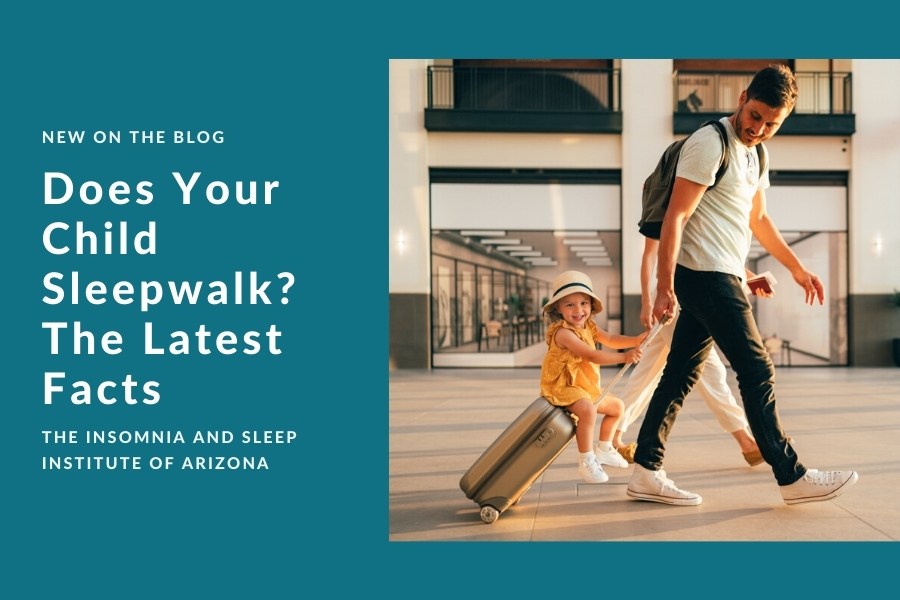If your child sleepwalks, once you get past the strangeness of it, your top concern is probably their safety and quality of sleep. A recent study from the University of South Australia examines the link between sleepwalking in children and “daytime difficulties.” However, at The Insomnia and Sleep Institute of Arizona, we want to remind you that quality sleep is critical for people of all ages. There is a myriad of sleep disorders, and we treat all of them at this outcome-driven clinic where your first meeting (consultation) is with a sleep expert who can diagnose sleep disorders. Here, you can find “Top Doc” in the region as voted by his peers for the past six consecutive years. Triple board-certified Dr. Ruchir P. Patel is proud to offer you the Face of Sleep Medicine in Arizona where we treat patients as young as two and are committed to providing you with unparalleled staffing levels.
Sleepwalking is a relatively common behavior in children, and most (but not all) grow out of it. According to the lead researcher, “Although [sleepwalking usually has no negative consequences, it can result in injuries including cuts and abrasions.” As such, he undertook a study that included 1,814 children between the ages of 5 – 10. Of these children, 10.5 percent of their parents say they found them sleepwalking in the last week. The parents reported that their child typically only sleepwalks about once per week, though some are more frequent. This was the first such study in Australia and it found that sleepwalking is linked to a host of other nighttime problems such as bedtime anxiety, sleep talking, sleep apnea, sleep terrors, poor bedtime routines, restless sleep, and sleep grinding. According to the researchers, behavioral and emotional issues are often connected to sleep problems, too.
Behavior, Emotions, and Sleep
While it is no surprise that poor sleep is connected to poor behavior and emotional difficulties, the researchers found that “unlike other sleep conditions … sleepwalking itself does not cause daytime emotional and behavioral problems.” However, parents should still ensure a safe sleep environment so that accidents do not happen during a sleepwalking episode. Curiously, the researchers only urge parents to see a sleep specialist if the sleepwalking or other sleep issues are “concerning.” Any sleep issue, concern, or disturbance is cause to see a sleep specialist regardless of a person’s age, but especially for children. The problem being a common occurrence does not equate to a “normal” or healthy sleep.
Sleep behaviors like sleepwalking can be managed and treated, so parents need not worry that their child’s sleepwalking is going to inherently cause a massive negative impact on their life—as long as it is treated. People of all ages have long been reported to do strange and sometimes highly-skilled tasks while sleepwalking. Technically known as somnambulism, sleepwalking occurs during NREM, the deepest form of a dreamless sleep. It was reported in a 2012 article in Neurology that up to 30 percent of people sleepwalk at some point in their life. This groundbreaking article reported a much higher occurrence than ever before. It is often suggested that sleepwalking can be triggered by anxiety, stress, and even alcohol. However, sleepwalking can happen for seemingly no reason at all, particularly in children.
“Treating” Sleepwalking
“Treating” sleepwalking, particularly in children, often focuses on sleep hygiene. In some cases, short-term medication may be helpful. Sleep hygiene can be improved in most cases, particularly for children, as can sleep schedules and daytime activities. Reducing stress and anxiety, and perhaps treating mental health co-morbidities, can also play a role in minimizing or stopping sleepwalking occurrences. Most people, of all ages, can benefit from assessing their sleep hygiene. For children, this can also set them up for better, successful sleep as they grow older. Sleep hygiene and habits must be learned, and the earlier you start, the better.
If you know or suspect that your child sleepwalks, start working with a sleep expert today to keep them safe and healthy. Contact The Insomnia and Sleep Institute today to schedule your consultation with a sleep expert. No referral is needed. Call the office or complete the online form for the quickest response.





